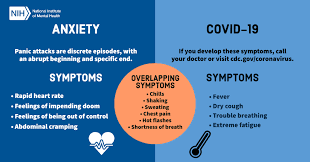Spring 2022 Post 7
Many people struggle with mental illness, and though society is still processing what is and is not considered a mental stigma, awareness is being brought to attention. During a significant pandemic, we seem not only to struggle through diverse matters but acknowledge the conditions unforeseen by the brain. The neurological study of the brain has plagued many professionals with issues relating to disease of the mind. How do we cure remembrance or a break in mental functioning? How severe can autism be? Is depression a symptom or diagnosis? Is mental illness accurate? All these questions lead to subcategories that lead to people asking if they will be ok?
During this pandemic, a question arose of if COVID had increased the ratio of people having mental disease compared to before COVID? Several scientific research articles were published to exemplify the answers to this question. The statistical data was conducted by many professionals, including the (Centers for Disease Control and Prevention). The CDC did a Household Pulse Survey to understand how people cope with mental illness during Covid. This 20-minute online survey was designed to complement the ability of the federal statistical system to rapidly respond and provide relevant information about the impact of the coronavirus pandemic in the U.S (CDC,2022).
NCHS included questions to obtain information on the frequency of anxiety and depression symptoms. The questions are a modified version of the two-item Patient Health Questionnaire (PHQ-2) and the two-item Generalized Anxiety Disorder (GAD-2) scale on the Household Pulse Survey, collecting information on symptoms over the last 7 days (rather than the typical 14 days) (CDC,2022). These surveys help form the background to literature reviews that many professional researchers conclude. The main thing that plagues researchers is the severity pandemics like COVID have on increasing the mental health of a population as well as initiating it. This research lays ground to understanding how future generations will function and how we may need to change the neurological aspect of how we diagnose and help society now and in the future. After all, we know that No matter what age you are mental health has no bias on its victims.
Centers for Disease Control and Prevention. (2022, February 16). Mental health - household pulse survey - covid-19. Centers for Disease Control and Prevention. Retrieved March 9, 2022, from https://www.cdc.gov/nchs/covid19/pulse/mental-health.htm




Comments
Post a Comment